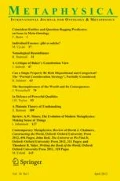Abstract
We consider here several versions of finitism or conceptions that try to work around postulating sets of infinite size. Restricting oneself to the so-called potential infinite seems to rest either on temporal readings of infinity (or infinite series) or on anti-realistic background assumptions. Both these motivations may be considered problematic. The approaches centering on the indefinitely large and the use of schemata would provide a work-around to circumvent usage of actual infinities if we had a clear understanding of how schemata work and where to draw the conceptual line between the indefinitely large and the infinite. Neither of this seems to be clear enough. Versions of strict finitism in contrast provide a clear picture of a (realistic) finite number theory. One can recapture standard arithmetic without being committed to actual infinities. The major problem of them is their usage of a paraconsistent logic with an accompanying theory of inconsistent objects. If we are, however, already using a paraconsistent approach for other reasons (in semantics, epistemology or set theory), we get finitism for free. This strengthens the case for paraconsistency.
Similar content being viewed by others
Notes
And even excluding negations of schemata like (CA) seems to leave one with primitive recursive arithmetic. Remember that the primitive recursive function do not include μ-minimization. Primitive recursion comes down to bounded quantification. To have the usual means of logic available Hilbert allows these non-finite formula in, but considers them as “ideal” (i.e. devoid of respectable finitist content). Formulas are only considered in their inferential role. The formulas themselves can then be taken as the new (material) objects of this reasoning. Thus, finitism gives way to formalism.
Rational numbers are chosen only for convenience: One uses a rational to insert some Ω between others, e.g. Ω 3, Ω 4, now we insert Ω 7/2 for some indefinite realm between the two. A renumbering would do as well.
This does not provide us with an easy road to the consistency of ZFC, since proving that every subset of Fin(ZFC) is consistent may be well beyond us by the Ωs being indefinitely large. One cannot simply check them – but cf. strict finitism below!
Present physics is compatible with a discrete picture of the universe where the basic building blocks are space-time regions having the minimal size of Planck-length (10−35 m) and the minimal temporal duration of Planck-time (10−43 s), thus comprising 10−148 m3s. Given the present theories, the universe is roughly 1078 m3 large and 1018 s old. Thus, the number of basic objects is 10244, well below 21,000. Of course, nothing forbids choosing 21,000,000 if needed.
So if one for some other reason has adopted a paraconsistent logic, this step is (further) vindicated by finding another field of useful application of paraconsistency. Providing the logical framework for strict finitism thus strengthens the case for strong paraconsistency.
They can be excluded in some second order semantics for second order set and number theory, see (Shapiro 1991).
Since paraconsistency is not a matter of quantificational theory one may add standard quantificational rules or one’s preferred non-standard account (like Free Logic quantification).
Remember that numerals are just devices of convenience to substitute for expressions like: 0′′′, 0′′′′′, 0′′′′′′′ – etc. A finitist thus has not to assume some pre-given infinite set of numerals (or variables).
References
Batens, Diderik (2000). “A Survey of Inconsistency – Adaptive Logics”, in: Batens, Diderik et al. (Eds.) Frontiers of Paraconsistent Logic. Baldock.
Bremer, Manuel (2005). An Introduction to Paraconsistent Logics. Bern et al.
George, Alexander/Velleman, Daniel (2002). Philosophies of Mathematics. Malden/Oxford.
Hilbert, David (1925). “Über das Unendliche”, Mathematische Annalen, 95 (1926), pp. 161–90.
Lavine, S. (1998). Understanding the Infinite, Cambridge/MA, 2nd Ed.
McCarty, David (1985). Realizability and Recursive Mathematics. Edinburgh.
Moore, A. W. (1993). The Infinite, London, 2nd Ed.
Mortensen, Chris (1995). Inconsistent Mathematics. Dordrecht et al.
Mycielski, Jan (1981). “Analysis without Actual Infinity”, The Journal of Symbolic Logic, 46, pp. 625–33.
Mycielski, Jan (1986). “Locally finite theories”, The Journal of Symbolic Logic, 51, pp. 59–62.
Oppy, Graham (2006). Philosophical Perspectives on Infinity. Cambridge.
Priest, Graham (1994). “Is Arithmetic Consistent?”, Mind, 103, pp. 337–49.
Priest, Graham (1997). “Inconsistent Models of Arithmetic”, Journal of Philosophical Logic, 95, pp. 410–26.
Priest, Graham (2005). Towards Non-Being. Oxford.
Priest, Graham (2006). In Contradiction. Oxford, 2nd Ed.
Russell, Bertrand (1919). Introduction to Mathematical Philosophy. London.
Shapiro, Stewart (1991). Foundations Without Foundationalism. Oxford.
Shapiro, Stewart (2000). Thinking about Mathematics. Oxford.
Van Bendegem (1993). “Strict, Yet Rich Finitism”, in: Wolkowski, Z. (Ed.) First International Symposium on Gödel’s Theorems. Singapore et al.
Van Bendegem (1999). “Why the Largest Number Imaginable Is Still a Finite Number”, Logique et Analyse, 42, pp. 107–26.
Van Bendegem (2003). “Classical Arithmetic is Quite Unnatural”, Logic and Logical Philosophy, 11, pp. 231–49.
Van Bendegem (2006). “Non-Realism, Nominalism and Strict Finitism”, Poznan Studies in the Philosophy of the Sciences and the Humanities, 90, Amsterdam/New York, pp. 343–68.
Author information
Authors and Affiliations
Corresponding author
About this article
Cite this article
Bremer, M. Varieties of Finitism. Int Ontology Metaphysics 8, 131–148 (2007). https://doi.org/10.1007/s12133-007-0012-9
Received:
Revised:
Accepted:
Published:
Issue Date:
DOI: https://doi.org/10.1007/s12133-007-0012-9



